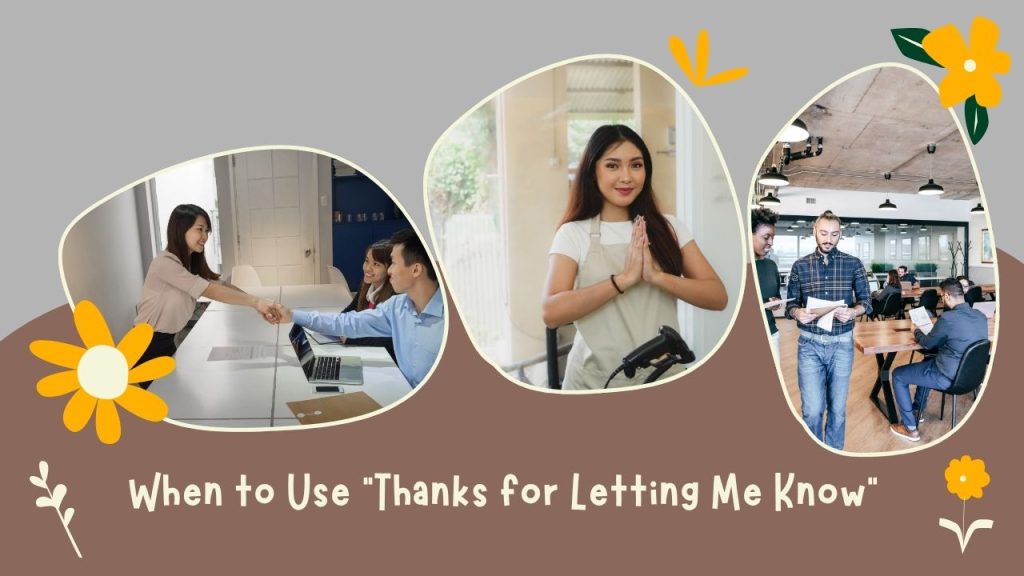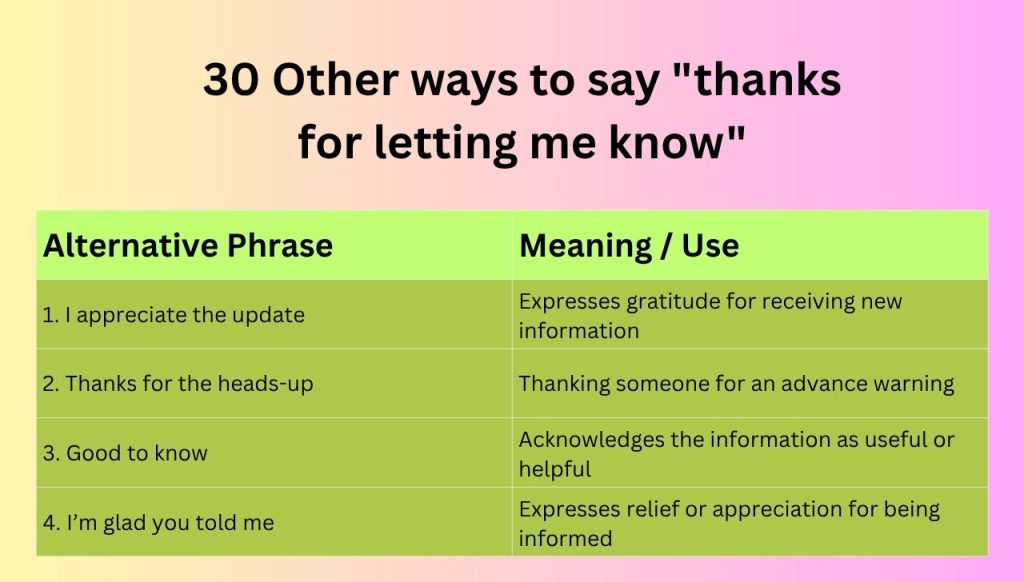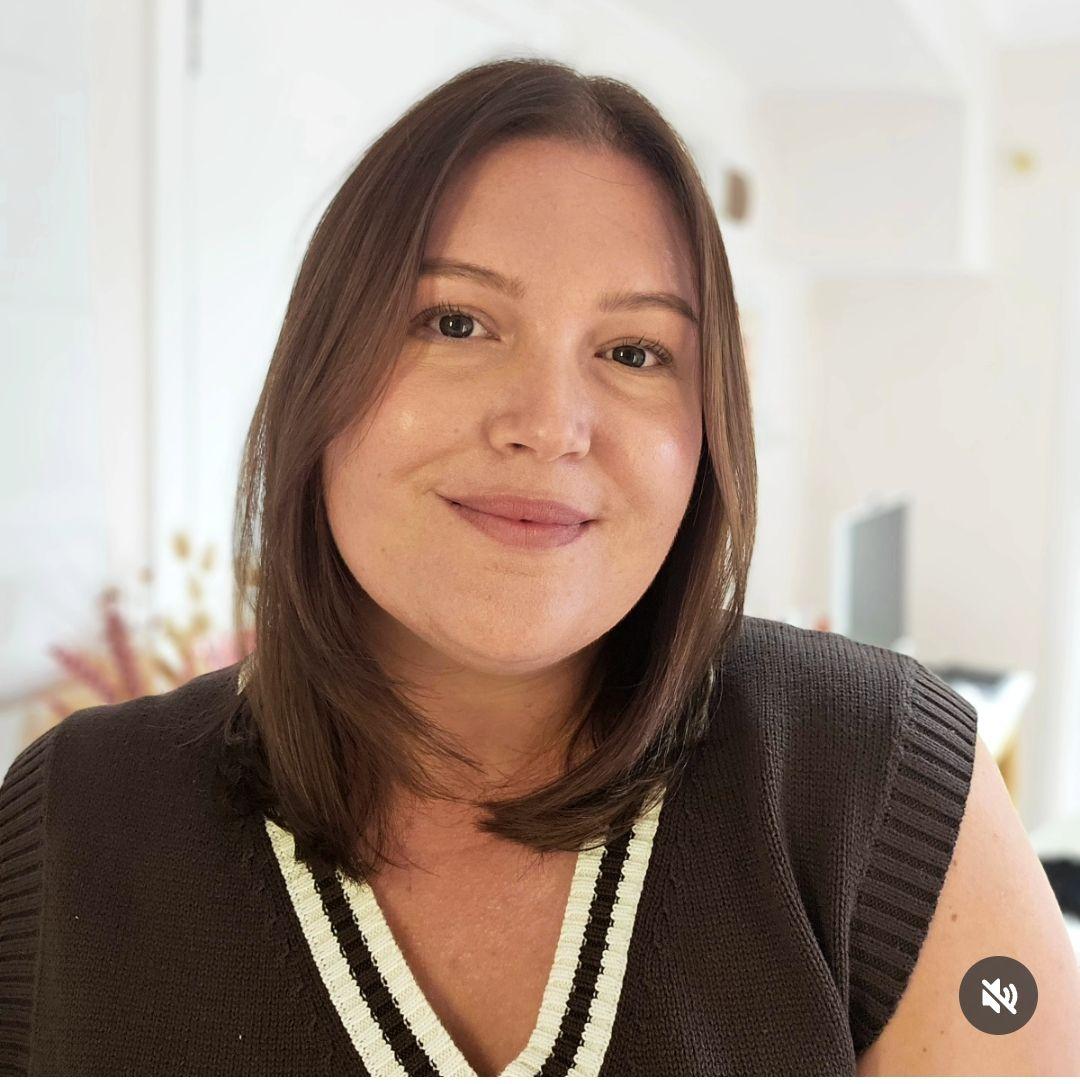You’ve probably typed or said, “Thanks for letting me know” more times than you can count. It’s one of those go-to phrases that fits just about every situation—from a quick Slack message to a more formal email. But let’s be honest: it can get a little stale, especially if you’re aiming to sound more thoughtful, more professional, or even just a bit less robotic.
So, what’s the alternative? Is there a better way to acknowledge new information or someone keeping you in the loop? Absolutely. The English language is rich with expressions; depending on your tone, context, or relationship, there’s always a better way to say it.
Before we get into the many colorful alternatives, let’s break down what this phrase means, when you should use it, and why it even matters in the first place.
Find Out More : 30 Other Ways to Say “Thank You for Your Understanding”
“Thanks for Letting Me Know” Meaning
At its core, “Thanks for letting me know” is a polite way of expressing appreciation when someone shares information with you. It could be a heads-up about a meeting change, a personal update, or even an alert about a potential issue. You’re acknowledging that someone took the time to tell you something relevant and signaling that you’ve received and appreciate the message.
The phrase carries a tone of courtesy and a touch of humility. You essentially say, “I value that you told me this.” It’s neutral, flexible, and widely understood—which is part of why it’s so commonly used.
But here’s the catch: Because it’s so commonly used, it can sometimes feel bland or impersonal. Like saying “fine” when someone asks how you are. Not wrong, just… a little flavorless.

When to Use “Thanks for Letting Me Know”
This phrase fits in many settings, but it’s beneficial when:
- You receive an update or new information.
- Someone informs you of a schedule or plan change.
- You’re told about a problem or concern that affects you.
- A coworker or friend shares something that requires no immediate action but is good to know.
Let’s say your manager emails you, “The meeting’s moved to 3 PM.” A quick “Thanks for letting me know” does the job. Or maybe your friend texts, “I might be late tonight.” Same thing. It works in business, casual chats, and everything in between.
Still, there are subtle nuances. In a formal setting, the phrase might come off as too casual. In a personal conversation, it might feel a little cold. That’s where some alternatives come in handy.
Why Say “Thanks for Letting Me Know”
Gratitude is never wasted. It’s not just about being polite; it’s about connection. Acknowledging someone who took the time to inform you helps maintain good communication and shows that you respect the person’s effort.
Also, it creates a small but essential loop of feedback. When you respond with thanks, you confirm that the message was received—and appreciated. It’s reassuring. Think about how awkward it feels when you tell someone something and get… radio silence. No “okay,” no “got it,” just a void. That’s why even a simple acknowledgment matters.
In professional settings, it can subtly convey that you’re dependable and communicative. You’re showing up, paying attention, and staying informed. It’s a tiny phrase that pulls a lot of weight.

30 Other ways to say “thanks for letting me know”
| Alternative Phrase | Meaning / Use |
|---|---|
| 1. I appreciate the update | Expresses gratitude for receiving new information |
| 2. Thanks for the heads-up | Thanking someone for an advance warning |
| 3. Good to know | Acknowledges the information as useful or helpful |
| 4. I’m glad you told me | Expresses relief or appreciation for being informed |
| 5. Thanks for informing me | Formal way of saying thanks for telling me |
| 6. Appreciate the info | Casual and friendly way to say thanks |
| 7. Got it, thanks | Acknowledges understanding and gives thanks |
| 8. Cheers for the update | British/Australian casual way to thank for an update |
| 9. That’s helpful, thanks | Shows appreciation for useful information |
| 10. Thanks for the notice | Thanks for being alerted or notified |
| 11. I value the update | A more formal and respectful expression |
| 12. Thanks for pointing that out | Used when someone highlights something important |
| 13. Much obliged | Old-fashioned or formal way to say thanks |
| 14. Appreciate you telling me | Grateful that the person shared information |
| 15. I’m thankful you shared that | Polite and sincere expression of thanks |
| 16. That’s good info, thank you | Acknowledges the usefulness of the information |
| 17. Thank you for the clarification | Used when someone clears up confusion |
| 18. Thanks for bringing this up | Shows gratitude when someone raises a topic or issue |
| 19. Thanks for the heads-up on that | Specifically for advance warning or notice |
| 20. Thank you for your transparency | Grateful for honest and open communication |
| 21. Appreciate your honesty | Thanks for being upfront |
| 22. Thanks for keeping me in the loop | Gratitude for being included in communication |
| 23. Thank you for your input | Polite way to thank someone for their comment or idea |
| 24. That’s useful, cheers | Friendly way of saying the info was helpful |
| 25. I’m grateful for the update | Slightly more formal and heartfelt expression |
| 26. That helps, thanks | Simple, clear appreciation for useful info |
| 27. Appreciate the heads-up | Similar to “Thanks for the heads-up” |
| 28. Thanks for clarifying | Used when someone clears up misunderstanding |
| 29. Thank you for letting me be aware | Polite, formal variant |
| 30. Thank you for the insight | Gratitude for a thoughtful or deep observation |
Find Out More : 30 Other Ways to Say “thank you for reaching out”
Conclusion
Saying “Thanks for letting me know” is always better than silence, but it doesn’t have to be your default. Swapping in a more thoughtful or tone-matched phrase can elevate your communication and show that you’re genuinely paying attention.
So the next time someone shares a piece of info—big or small—don’t just autopilot the same old reply. You’ve got options. Mix it up. Make it sound like you meant it. After all, good communication isn’t just about clarity—it’s about connection.

Grammar Nerd, ESL Trainer, Low-Key Comma Crusader
Daniel has taught English for over a decade, from small community classes in Oaxaca to bustling university halls in London. He has a knack for turning even the driest grammar points into relatable, real-life language tools—think fewer red pens, more real talk. He co-founded Grammation to make grammar less gatekeeper-y and more global. When he’s not decoding sentence structures, he’s probably hiking with a paperback novel or adding unnecessary hyphens for fun.
“The rules of grammar should empower people—not trip them up.”


